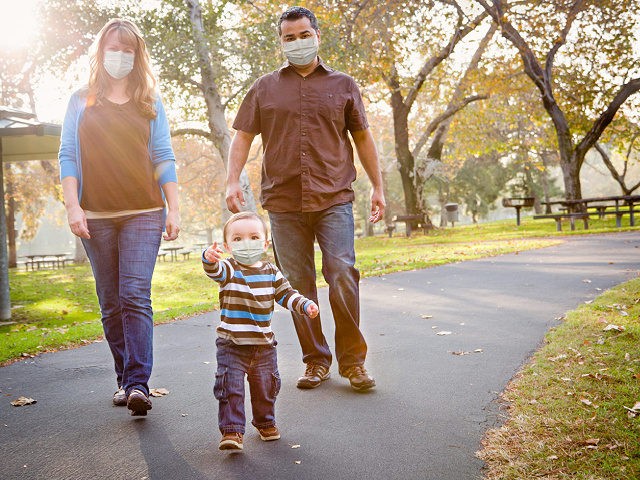Keeping children in masks all day is a perfectly appropriate tactic for combatting the coronavirus, according to the American Academy of Pediatrics (AAP).
In a series of tweets on Thursday, the organization that previously urged people to respect a child’s preferred gender argued that masks have virtually no negative effect on a child’s development, dismissing parental concerns as being either overblown or nonexistent.
“Research shows that schools where children and adults are consistently masked are effective in preventing the transmission of COVID-19,” the AAP claimed. “COVID remains a serious threat to children’s health. Universal masking can help make in-person learning safe this fall.”
After dismissing claims that masks do not minimize oxygen intake, the AAP then addressed concerns that masks negatively affect a child’s social development. According to the AAP, children are perfectly capable of learning complex communication like language and non-verbal expressions from masked adults. The AAP cited no evidence to support this highly charged claim and simply stated that “no studies” show it has a negative effect on children.
“Babies and young children study faces, so you may worry that having masked caregivers would harm children’s language development,” it said. “There are no studies to support this concern. Young children will use other clues like gestures and tone of voice.”
Contrary to the AAP’s assuredness, Scientific American magazine argued in February that masks can be “detrimental to babies’ speech and language development”:
Faces are a complex and rich source of social, emotional and linguistic signals. We rely on all of these signals to communicate with one another through a complex and dynamic dance that depends on each partner being able to read the other’s signals. Interestingly, even when we can see whole faces, we often have trouble telling what other people are feeling. For instance, as the psychologist Lisa Feldman Barrett has noted, we can interpret a smile as meaning “I’m happy,” “I like you” or “I’m embarrassed”. So, seeing partially visible faces robs us of a plethora of linguistic signals that are essential for communication.
While it may not be entirely false for the AAP to claim that masks have only a benign effect on a child’s development, the evidence remains inconclusive and cannot be accepted as an undisputed scientific fact given the topic’s ongoing and robust debate.
Research shows that schools where children and adults are consistently masked are effective in preventing the transmission of COVID-19. COVID remains a serious threat to children’s health. Universal masking can help make in-person learning safe this fall. https://t.co/ySEeCHGbWn pic.twitter.com/sqrRq3GTHU
— American Academy of Pediatrics (@AmerAcadPeds) August 12, 2021
Face masks do not reduce oxygen intake. Carbon dioxide molecules are very tiny, even smaller than respiratory droplets. They cannot be trapped by breathable materials like cloth or disposable masks. https://t.co/UDTrocuULN pic.twitter.com/Tn33NpBD32
— American Academy of Pediatrics (@AmerAcadPeds) August 12, 2021
Getting good protection from a mask may take extra attention for children with special health care needs, but it's possible and effective. Find tips here to help your child get used to wearing a mask and how to get it to fit correctly: https://t.co/wSPPznRi7s pic.twitter.com/F2tZE7UTLN
— American Academy of Pediatrics (@AmerAcadPeds) August 12, 2021
Masking now will help us end the pandemic sooner. Wearing a mask is a simple step we can all take to protect children and save lives. pic.twitter.com/Si0cGjUDxC
— American Academy of Pediatrics (@AmerAcadPeds) August 12, 2021
People on social media did not respond kindly to the AAP’s claim:
Are there any studies to support that children will "use other clues" as you described?
You say you need studies on the one hand, then just make an assumption on the other hand. You can't have it both ways. Either show your study, if that's what matters, or face common sense.
— Marc Pear (@marc_pear) August 12, 2021
This is so obviously not true it's breathtaking…
— Lance Hardy (@lance_hardy) August 12, 2021
Prove it… because my graduated speech kid is back to stuttering, and my little one cannot pronounce consonant sounds at the beginning of a word which is a clear indication of not seeing lips, and thus is in speech therapy.
— Anoroc Suriv (@AnorocSuriv2) August 12, 2021
In 2018, the AAP also argued that doctors and parents should affirm a child’s transgender identity irrespective of their biological sex.
“In a policy statement titled ‘Ensuring Comprehensive Care and Support for Transgender and Gender-Diverse Children and Adolescents,’ the group counsels ‘gender-affirming’ health care for minors who do not identify with their birth sex,” Breitbart News reported at the time.
Follow Paul Bois on Twitter @Paulbois39

COMMENTS
Please let us know if you're having issues with commenting.